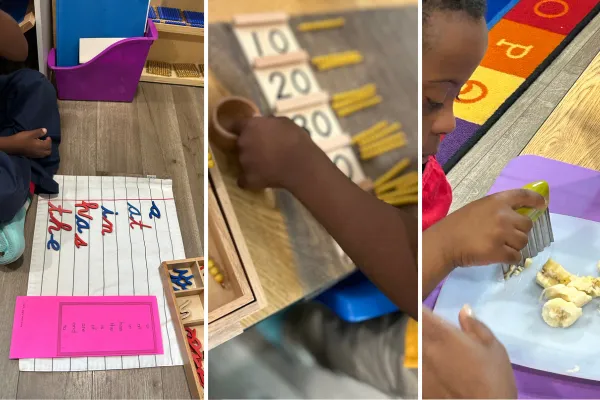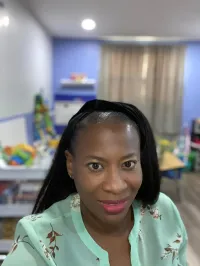
Discover the Montessori approach at Ambassador Kids Montessori
"The goal of early childhood education should be to activate the child’s own natural desire to learn." – Maria Montessori
Understanding the Montessori Approach: A Guide for Parents
At Ambassador Kids Montessori, a premier preschool with small class sizes, we use the Montessori approach to education. This unique method focuses on each child's natural curiosity and love of learning. By understanding the Montessori philosophy, parents can see how we help children grow in many different ways, both academically and personally.
What Is the Montessori Method?
The Montessori method was developed over 100 years ago by Dr. Maria Montessori. She believed that children learn best when they are free to explore in a prepared environment. Montessori education focuses on the whole child—mind, body, and spirit—and allows them to learn at their own pace. This approach respects each child’s individual learning style and encourages independence, creativity, and a love for learning.
Practical Life: Learning Everyday Skills
In the Montessori classroom, Practical Life activities are an important part of the curriculum. These activities help children learn everyday skills like pouring, buttoning, sweeping, and preparing food. Practical Life exercises are designed to be hands-on and help children develop fine motor skills, hand-eye coordination, and focus.
For example, when a child learns to pour water from a pitcher into a glass, they are practicing control and concentration. These activities help children feel confident and independent as they master tasks they can use in daily life.
Sensorial: Exploring Through the Senses
Sensorial activities in the Montessori classroom help children learn about the world through their senses—seeing, hearing, touching, tasting, and smelling. By working with materials that focus on different qualities like size, color, or texture, children learn to notice and understand differences and similarities.
For instance, children might use the Pink Tower to learn about size and balance or use the Sound Cylinders to match sounds. These activities help children develop their senses and improve their ability to think critically and solve problems.
Language: Building Strong Communication Skills
Language is a key part of the Montessori classroom. Children are exposed to a variety of language activities that help them develop strong communication skills and a love for reading and writing. They start with learning the sounds of letters and move on to reading and writing words and sentences.
Using materials like sandpaper letters and movable alphabets, children can feel the shape of each letter and connect it to its sound. This hands-on approach helps children learn to read and write in a fun and engaging way, setting a strong foundation for future literacy.
Mathematics: Understanding Numbers Through Hands-On Learning
Montessori math activities make abstract concepts concrete by using hands-on materials. Children learn about numbers, counting, and mathematical operations by manipulating objects like beads, rods, and number cards.
For example, children use the Golden Beads to learn about units, tens, hundreds, and thousands. By physically building numbers, they gain a clear understanding of place value and arithmetic. This method makes math fun and accessible, helping children develop a love for numbers and problem-solving.
Cultural Studies: Learning About the World
Cultural Studies in Montessori include geography, science, history, art, and music. These subjects are integrated into the curriculum to help children understand the world and its diverse cultures. Children learn about different countries, explore various traditions, and conduct simple science experiments to learn about nature and the environment.
Activities like map-making, exploring different cultures, and studying animals and plants help children develop a sense of curiosity and respect for the world around them. They learn about their place in the world and the importance of caring for the planet.
The Montessori Environment: A Place for Growth
At Ambassador Kids Montessori, our classrooms are designed to be welcoming and supportive. We keep our class sizes small to ensure that each child receives personalized attention. The environment is carefully prepared with materials that are within easy reach of the children, promoting independence and freedom of choice.
Children are encouraged to choose activities that interest them and work at their own pace. This freedom helps them take responsibility for their learning and discover their strengths and passions. It also fosters a sense of confidence and self-discipline that will benefit them throughout their lives.
Why Montessori Education Matters
Montessori education is about more than just academics; it’s about helping children grow into confident, independent, and compassionate individuals. By focusing on the five key areas—Practical Life, Sensorial, Language, Mathematics, and Cultural Studies—we provide a well-rounded education that prepares children for future success in school and life.
At Ambassador Kids Montessori, we believe in nurturing the whole child and helping each one reach their full potential. We invite you to visit our school, meet our dedicated teachers, and see how a Montessori education can benefit your child.
Join Us at Ambassador Kids Montessori
If you are looking for a premier preschool with small class sizes and a focus on individualized learning, Ambassador Kids Montessori is the perfect place for your child. We welcome you to schedule a tour and experience the Montessori difference. Together, we can create a strong foundation for your child's educational journey and instill a lifelong love of learning.

